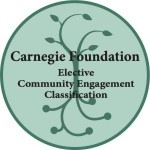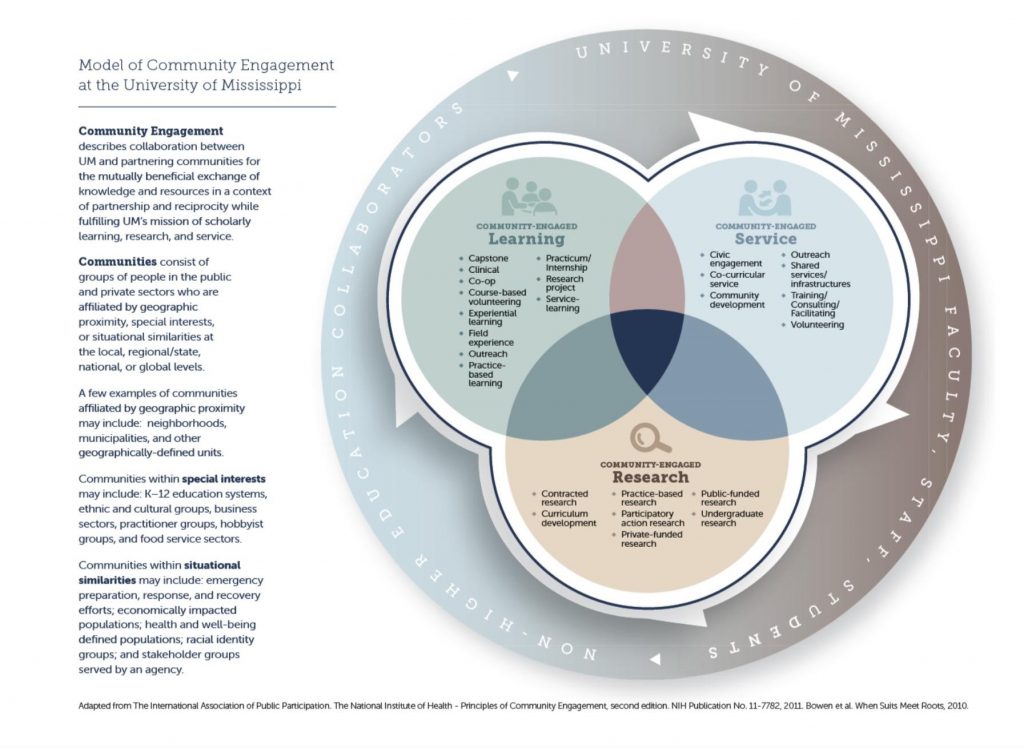A Year of Growth for Community Engagement at the University of Mississippi
2019 – 2020 was a year of tremendous growth and development for the Office of Community Engagement at the University of Mississippi. UM earned the Carnegie Classification for Community Engagement as a Public Research 1 University, hosted a number of signature events, celebrated a host of campus wide initiatives and programs, hired new staff, and built new relationships – or strengthened existing relationships – with community partners in the Lafayette Oxford University (LOU) community.
Over the course of this coming week, we want to share the highlights of the past year by covering a different theme each day on the CE blog.
Today, we will focus on highlights from around campus this past year with a special focus on the Carnegie Classification.
On Tuesday, we will talk about our existing and emerging community partnerships.
On Wednesday, we will discuss how the Office of Community Engagement has grown over the past year.
And on Thursday, we will talk about the field of community engagement in higher education, looking at some of the core ideas and practices in our work and gesturing towards the future of this work in the months and years ahead.
Friday will be a digest with all of these updates in a single place.
Without further ado….
The Carnegie Classification for Community Engagement

In January, the University of Mississippi was bestowed the prestigious Carnegie Classification for Community Engagement, which the hosting institution Brown University describes as “an evidence-based documentation of institutional practice to be used in a process of self-assessment and quality improvement.”
As University of Mississippi news reported, UM become one of “243 institutions of higher education nationwide given the Elective Carnegie Community Engagement Classification. The distinction, which is valid until 2026, honors recipients for proven commitment and activity in finding ways to engage with community partners, building on community assets and addressing a wide array of community challenges.”
Assistant Vice-Chancellor for Community Engagement Cade Smith captured the years long process the led up to the classification. “UM’s commitment to community engagement has continuously developed over the past four decades,” he said. “The application involved extensive data collection and documentation of important aspects of institutional mission, identity and commitments to community engagement.”
The team that worked on the classification included:
- Cade Smith, assistant vice-chancellor for community engagement
- Lindsey Abernathy, associate director of the Office of Sustainability
- Laura Antonow, director of college programs and instructional assistant professor of higher education
- Katie Busby, director of the Office of Institutional Research, Effectiveness and Planning and instructional assistant professor of higher education
- Tammy Dempsey, assistant dean of students and assistant professor in the School of Nursing and director of community engagement and service learning at the UM Medical Center
- Erin Holmes, associate professor of pharmacy administration and research associate professor
- Laura Martin, associate director of the McLean Institute for Public Service and Community Engagement
- Albert Nylander, professor of sociology and director of the McLean Institute
- Erin Payseur Oeth, project manager for community engagement
- Cristiane Surbeck, associate professor of civil engineering
This graphic below illustrates UM’s approach to community engagement, as presented in the Carnegie Application process.

Community engagement is taking place across the campus, with significant projects happening in colleges, schools, and departments university-wide. The projects below, while not an exhaustive list, were all critical to the success of the Carnegie application:
Empowering Individuals to Reduce Lead Exposure through Community-Based Research
Community Partners: Tri-County Workforce Alliance, Right! From the Start Initiative, Mississippi Urban League, Rosemont Baptist Church
Institutional Partners: Stephanie Otts; Mississippi Law Research Institute/ National Sea Grant Law Center, School of Pharmacy, Center for Population Studies, Civil Engineering
Purpose: Community-based research to reduce lead exposure in drinking water.
Base Pair-Biomedical Research Mentorship
Community Partners: Murrah High School, Jim Hill High School
Institutional Partners: Rob Rockhold, Deputy Chief Academic Officer; UMMC Microbiology, Medicine
Purpose: To improve high school STEM education and matriculation of under-served minorities into college programs using mentoring, laboratory experimentation and community engaged teaching, learning and scholarship.
Behind the Big House: Interpreting Slavery in Local Communities
Community Partners: Preserve Marshall County and Holly Springs, Inc., The Hugh Craft House, Holly Springs Historic Preservation Commission, Gracing the Table, Rust College Division of Humanities, LOCAL
Institutional Partners: Jodi Skipper, Carolyn Freiwald, Sociology & Anthropology
Purpose: Pilgrimage tours throughout the South immerse visitors in re-creations of the antebellum era, focusing largely on historic homes. In the city of Holly Springs, Mississippi, historic preservation advocates have created the Behind the Big House program, collaborating with academic researchers to ensure that these re-creations of local history move beyond the city’s large mansions to explore the town’s many extant slave dwellings, and work to interpret the experiences of the enslaved people who inhabited them.
Lafayette County Lynching Memorialization Project
Community Partners: William Winter Institute for Racial Reconciliation, Lynching Memorialization Steering Committee
Institutional Partners: Hans Sinha, School of Law, Sociology & Southern Studies, Theatre Arts, Music, Horizons, Journalism, Intensive English Program
Purpose: The Lynching Memorialization in Lafayette County Project is a broad-based coalition of University and Community members. The purpose of our Project is two-fold: (1) We are seeking a remedy for the wrongs committed against seven citizens of our community who were victims of racially motivated murders in Lafayette County between 1877 and 1950. None of these seven people were afforded due process by their government — their murders were never prosecuted and their names have not been publicly remembered as victims of crimes; and (2), through doing so, we are seeking to engage the community in and foster a discussion about race and reconciliation in our community.
Community Partners: The Marks Project
Institutional Partners: Anne Cafer, Kimberly Kaiser, Georgianna Mann; Community Based Research Collaborative, Center for Population Studies, Legal Studies, Nutrition and Hospitality Management
Purpose: The Marks Project is a community-university collaboration that seeks to identify local stakeholders in Marks and Quitman County to address deficits in the community that require immediate attention. They assist on a short term basis with solutions that may include immediate funding, positioning with local partners, and matching outside resources to the community of Marks.
PaRTICIpate Research Collaborative
Community Partners: Patient-Centered Outcomes Research Institute
Institutional Partners: Meagen Rosenthal, Erin Holmes; School of Pharmacy
Purpose: Community engaged scholarship to develop patient-centered research questions around Type 2 Diabetes self-management and design of pharmacist-led weight management programs in Oxford, Charleston, and Saltillo, Mississippi.
Community Partners: Jackson community
Institutional Partners: UMMC, Dr. Joyce Olutade
Purpose: The Jackson Free Clinic was founded in 2000 to offer high quality medical care to those without health insurance. It is the state’s only student-run medical clinic and operates as an independent 501(c)(3) organization. The clinic’s mission is to provide health care to Jackson’s community while also helping students and volunteers to learn and grow as future doctors, dentists, occupational and physical therapists, and humanitarians. The clinic addresses health disparities through community engaged teaching and learning, as well as community engaged service.
Community Partners: Mississippi Special Supplemental Nutritional Program for Women, Infants and Children (WIC); Mississippi State University Extension Service, Delta Region
Institutional Partners: Abigail Gamble, PhD; Bettina Beech, DrPH; John D. Bower School of Population Health, Mississippi Center for Obesity Research, Mississippi Center for Clinical and Translational Research, UMMC
Purpose: This community-based research investigation seeks to identify psychosocial, cultural, and environmental determinants of exercise among pregnant/postpartum adolescents enrolled in the Supplemental Nutritional Program for Women, Infants, and Children (WIC). UMMC is partnering with WIC to inform and engage adolescent WIC clients in the study, and to gain the perspectives of WIC providers whom provide counseling to clients in the MS Delta. This entire line of research is designed to promote the adoption and maintenance of exercise behavior among pregnant and postpartum WIC clients during critical periods of fetal, infant, and maternal growth and development, with the goal to improve maternal and fetal health outcomes among a vulnerable and high-risk population.
Eastmoor Estates Fair Housing Project
Community Partners: Eastmoor Estates Neighborhood Association, Hope Enterprise Corporation
Institutional Partners: Desiree Hensley, Robert C. Khayat School of Law, Housing Clinic, Transactional Clinic
Purpose: In 2010, the UM Low Income Housing Clinic (LIHC) filed suit in federal district court in Mississippi on behalf of its class of clients, a group of African-American residents living in a low income neighborhood in Eastmoor, Mississippi. The suit alleged a host of claims, all related to the
failed management of the neighborhood development. The merits of the lawsuit were hotly contested, as was the LIHC’s fundamental philosophy that its clients, citizens of a state and an area with a history of marginalizing low-income people of color, not only deserved better, but deserved better in the very homes and community that many of them had spent their lives trying to build. The case ultimately settled on terms favorable to the plaintiffs. The most tangible and immediate result was that not only would the homeowners no longer had to live in a neighborhood with sub-standard government services – streets in disrepair, a malfunctioning water system, dilapidated sewer systems – but that they also would acquire the most important prize of all: deeds to their houses.
Community Partners: Yoknapatawpha Arts Council
Institutional Partners: Robert Saarnio
Purpose: Synergy, coordination, and mutual organizational support of mission-aligned arts programs, both in development and implementation phases.
Mississippi Entrepreneurship Forum and Business Development Webinars
Community Partners: Mississippi Development Authority,
Institutional Partners: Albert Nylander, JR Love; McLean Institute for Public Service and Community Engagement
Purpose: Strengthen the entrepreneurial ecosystem in Mississippi through community-campus partnerships spanning the public, private, and nonprofit sectors.
Community Partners: Togo Clean Water Project, Equador Clean Water Project
Institutional Partners: Cris Surbeck, Marni Kendricks; Engineering
Purpose: The connection between north Mississippi and Togo reaches back to 2004, when local community members traveled to Togo during the summer for medical mission trips. These encounters planted a seed that would later take root as a longstanding partnership between the School of Engineering and the rural Togolese communities in the Vogan region of Togo. In 2009, a chapter of Engineers Without Borders-USA was founded at UM. EWB-USA partners with communities in developing countries to improve their quality of life by implementing sustainable and economical engineering projects. Through these partnerships, EWB-USA promotes social responsibility among its network of student and professional engineers.
Catalyzing Entrepreneurship and Economic Development (CEED)
Community Partners: Catholic Charities Jackson
Institutional Partners: Albert Nylander, JR Love; McLean Institute for Public Service
Purpose: Create actionable partnerships to promote community and economic development through innovation and entrepreneurship.
Community Partners: New Albany Main Street Association
Institutional Partners: Albert Nylander, Laura Martin; McLean Institute for Public Service
Purpose: M Partner was designed after a national model, the Educational Partnerships for Innovation in Communities Network (EPIC-N), with a purpose to support the Healthy and Vibrant Communities pillar in the Flagship Forward strategic plan. M Partner is led by staff at the McLean Institute. This initiative offers a framework through which community and university representatives can cultivate mutually beneficial partnerships that will lead to the co-creation of knowledge and ideas to enhance community wellbeing. The University and the partner communities have committed to a pilot phase of 18 to 24 months in the partner communities of Charleston, Lexington, and New Albany.
North Mississippi VISTA Project
Community Partners: Sunflower Freedom Project
Institutional Partners: Albert Nylander, Laura Martin; McLean Institute for Public Service
Purpose: The North Mississippi VISTA Project, which is housed at the McLean Institute, seeks to fight poverty through education by upholding the VISTA principles of poverty alleviation, capacity building, sustainable solutions, and community empowerment. NMVP works in a 28 county area in North Mississippi and currently hosts 1 VISTA Leader and 19 yearlong VISTA members. Each summer, NMVP hosts between 10 and 25 Summer Associates.
